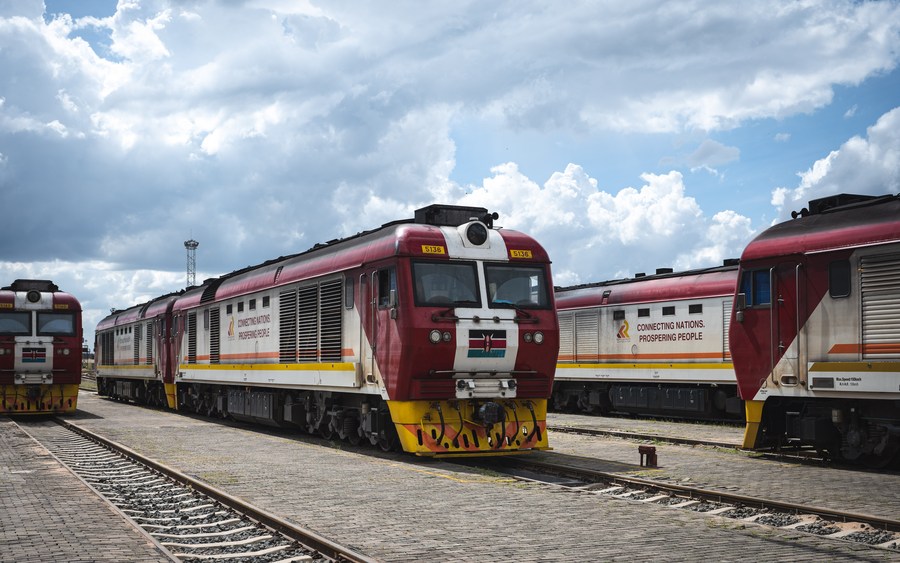
This photo taken on May 23, 2023, shows trains of the Mombasa-Nairobi Railway in Nairobi, Kenya.(Xinhua/Wang Guansen)
The Chinese-built Mombasa-Nairobi Standard Gauge Railway (SGR), which helps boost the mobility of people, goods and services, will contribute to the long-term growth, peace and stability of the Horn of Africa region, experts have said.
MOMBASA, Kenya, Aug. 26 (Xinhua) -- The Chinese-built Mombasa-Nairobi Standard Gauge Railway (SGR), which helps boost the mobility of people, goods and services, will contribute to the long-term growth, peace and stability of the Horn of Africa region, experts have said.
Speaking at a forum in Kenya's coastal city of Mombasa Wednesday, scholars from pan-African think tanks noted that since its launch on May 31, 2017, the 480-km SGR has fostered connectivity, cross-border trade, people-to-people interactions that boost the stability and inclusive growth of the greater Horn of Africa region.
The forum, convened by Africa Policy Institute, a pan-African think tank based in Nairobi, the capital of Kenya, shed light on the centrality of the Chinese-built modern railway in promoting regional peace and development.

Railway workers listen to rules on operation before their shift in Nairobi, Kenya, May 23, 2023.(Xinhua/Wang Guansen)
The day-long forum, on China-Africa cooperation on the outlook on peace and development in the Horn of Africa, was held under the theme of "Kenya on Track: The Impact of the Standard Gauge Railway."
"China is deepening the structural frameworks of its engagement with Horn of Africa countries. Through projects like the SGR, China has ensured that the nexus between peace and development is sustained," said Peter Kagwanja, the chief executive officer of Africa Policy Institute.
The Chinese-built modern railway in Kenya reaffirms the enduring strength of mutually beneficial partnership, a key highlight of the 15th BRICS Summit in Johannesburg, South Africa, Kagwanja said.
Stephen Jackson, the UN resident coordinator for Kenya, said the SGR, a key component of the China-proposed Belt and Road Initiative (BRI), has demonstrated that investments in modern infrastructure have the potential to connect, prosper, and stabilize the Horn of Africa region, which has long been seen as synonymous with resource-based conflicts and climatic shocks.
Thanks to unhindered trade, financial integration, improved investment climate, and enhanced human interactions facilitated by the modern railway, the region could unlock key sectors like agriculture, livestock, and mining, Jackson said.
He added that Chinese investments and strategic deployment of soft power have injected vitality into multilateral efforts aimed at ending strife and violent extremism in the Horn of Africa region.

The first train of the Mombasa-Nairobi Standard Gauge Railway (SGR) arrives at Nairobi Terminus in Nairobi, Kenya, May 31, 2017. (Xinhua/Chen Cheng)
The prospects for long-term peace, stability, and shared growth in the region are higher, now that the Mombasa-Nairobi SGR has accelerated opening up and interconnectedness, said Mustafa Ali, chairman and co-founder of HORN International Institute for Strategic Studies, a Nairobi-based think tank.
He said that Chinese-funded infrastructure projects will be key to unleashing skills and technology transfer, to empower and give hope to about 70 percent of youth in the Horn of Africa who are below 35 years of age.
In addition, Ali said, Chinese investments in modern infrastructure and skills development will boost the resilience of economies in the Horn of Africa, helping prevent its youth from joining radical groups.
The SGR has enhanced the integration of communities, a prerequisite for peace and harmony, said Fred Jonyo, the chairman of the Department of Political Science at the University of Nairobi.




 A single purchase
A single purchase









